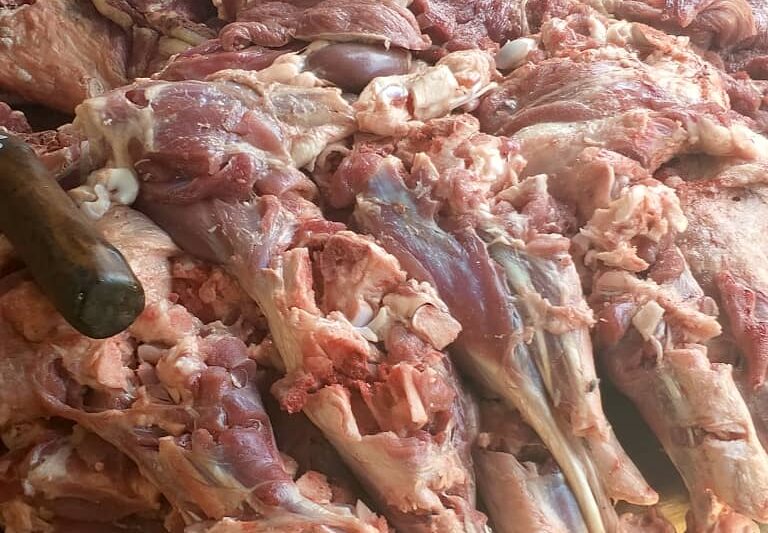Prices of livestock and raw meat soar as the naira continues to depreciate and the inflation rate hits record-high levels
The seemingly ever-depreciating naira and soaring inflation rate have had a major effect on the cost of livestock which has skyrocketed in recent months.
This has resulted in traders in Borno State increasing their prices, which in turn have led to a decline in the number of buyers.
The sale of raw meat has also been affected as many citizens throughout the state say they cannot afford the flesh and now buy only bones – if they have enough money because even the price of bones has increased.
Dealers in livestock are complaining bitterly because they are not making the sales they made before the naira’s record-low foreign exchange rate and the record-high inflation rate.
A dealer at Kasuwan Shanu, the main cattle market in Maiduguri, Borno State’s capital, told RNI that the price of a day-old chicken used to be between ₦600 and ₦650, now it is ₦900; an older, but not yet mature, chicken used to cost between ₦2,500 and ₦3,500, now the price is ₦3,800 to ₦7,000; cattle used to cost between ₦80,000 and ₦300,000, now the price is between ₦250,000 and ₦1 million; the price of goats used to be between ₦15,000 and ₦30,000, now the price starts at ₦35,000; and sheep used to cost around ₦40,000, now they start at ₦85,000.
“The average citizen in Borno State can no longer afford to buy livestock. The cost is beyond their reach,: he said. “Business is moving like a snail. Even day-old chickens have become quite pricey.”
Abubakar Bulama, the chairman of Kasuwan Shanu’s livestock bone sellers’ association, said many people could not afford to buy raw meat anymore – a kilo that used to be ₦1,000 now costs ₦1,800 to ₦2,000.
“Things have changed. People who used to come to the market to buy raw meat are now buying bones instead because they are cheaper.
“The prices of all raw meat have increased. Some buyers cannot even afford to buy bones. We have seen a huge drop in sales. We have to put up the prices if we want to make a profit. But because we put up the prices, we now have far fewer buyers.”
He told RNI that there were hardly any people at the tents where raw meat was sold, but at the tents where bones were being sold there were crowds of people.
“That tells you everything,” he said.
Tata Baba Haruna, who sells meat at the market, said: “Previously, a kilo of raw meat was sold for ₦2,700 or ₦2,800 or even ₦3,000, depending on the quality, but now we sell it for between ₦3,200 and ₦3,500.
“The people who used to buy a kilo of raw meat can no longer afford it and now they might buy half a kilo.
“If a person comes to the market with a budget of ₦4,000 and sees how much the meat costs, he usually ends up buying only bones, which cost between ₦2,000 and ₦2,500.”
Musa Ali Kano, a resident of Maiduguri, said: “In the past, no matter how much the price of raw meat went up the bones wouldn’t go over ₦200, but now they cost ₦1,100 or even ₦2,000.
“If you spend ₦200 on bones these days, you won’t even have enough to make a day’s soup.
“At the rate the naira is depreciating, we soon won’t even be able to buy bones, let alone raw meat.
“Previously, for special occasions, such as weddings or naming ceremonies, a whole ram or cow would be slaughtered. But now we buy ₦5,000 worth of meat and mix it with ₦6,000 worth of bones. We have been forced to do this to save being embarrassed in front of friends and family.”
AYSHA MUSTAPHA KOLOMI






